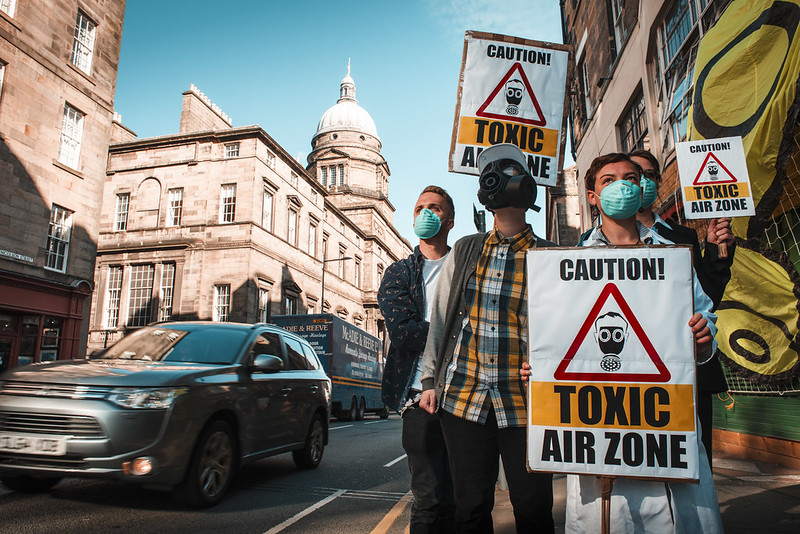A recent report has revealed that air pollution caused more than one in 29 deaths last year in Edinburgh, which is higher than any other Scottish city.
The report by the Centre for Cities in collaboration with urban policy researchers detailed that Edinburgh was the most at risk in comparison to other urban areas in Scotland, as reported by the Edinburgh Evening News.
With climate change becoming an increasingly important issue, this analysis of data offers new insights regarding the issue of pollutants that may cause health problems to residents in urban centres.
Local air quality management records the levels of air pollution and pollutants, and therefore regularly checks levels of nitrogen dioxide and fine particulate matter with a diameter less than 2.5 micrometers (PM2.5).
PM2.5 are said to be particularly damaging as they can take the form of dust or ash and are easily absorbed into the bloodstream.
The British Heart Foundation has expressed concern regarding the rise in stroke and Image: Friends of the Earth Scotland via Flickr Friends of the Earth Scotland on Nicolson Street as they call for cleaner air. heart problems in relation to increasing air pollution.
Despite having a lower death rate than Glasgow – at 354 deaths in 2019 – the report indicates that 157 deaths in Edinburgh related to PM2.5, meaning that 3.7 per cent of deaths were caused by air pollution in comparison to 3.4 per cent in Glasgow.
Speaking to The Student, a spokesperson from Glasgow City Council said: “We have a number of initiatives in place or being developed that aim to improve air quality in Glasgow.
“A wide range of work is underway in Glasgow to encourage higher levels of active travel, drive up standards in public transport and reduce the reliance on polluting private vehicles.
“The £115m City Deal Avenues project will transform the urban realm of 21 major streets in Glasgow city centre to encourage more walking, cycling and economic growth.
“Similar plans for Byres Road in the city’s West End will also support a focus on cycling, reduce the availability of car parking and create a better environment.”
Local authorities such as Glasgow therefore aim to reduce emissions within city centres through prioritising greener energy sources such as electricity that can be used to power vehicles. A spokesperson for Glasgow City Council added:
“Since the start of this year, as part of the phased implementation of Glasgow’s Lower Emissions Zone (LEZ), at least 40 per cent of journeys through the city centre will now be made by buses that meet the required emission standard.
By the end of 2022, this will rise to 100 per cent at which time the LEZ will broaden in scope and become applicable to all other vehicle types, including taxis and private cars.
“The recently introduced bus gates in the city centre are steering hundreds of vehicles away from what were highly congested streets every hour, which will also help to reduce emissions in the area.
“In addition, we are doubling the number of electric vehicle charging points provided by the council and have started work on converting our 1300-strong fleet of vehicles to electric or hydrogen power by the end of 2029.”
Michael Gove in his role as Environment Secretary aimed to reduce emissions of PM2.5 via The Cleaner Air Strategy in January last year. In this publication it was reported that:
“Burning wood and coal in open fires and stoves makes up 38% of the UK’s primary emissions of fine particulate matter (PM2.5).”
Transport & Environment vice convener councillor Karen Doran said to the Edinburgh Evening News that: “We’re also working closely with the Scottish Government on the revision to the Cleaner Air for Scotland Strategy, which will address issues relating to wood burning stoves, which could have a greater impact on Edinburgh’s densely-populated urban areas.”
Image: Friends of the Earth Scotland via Flickr

